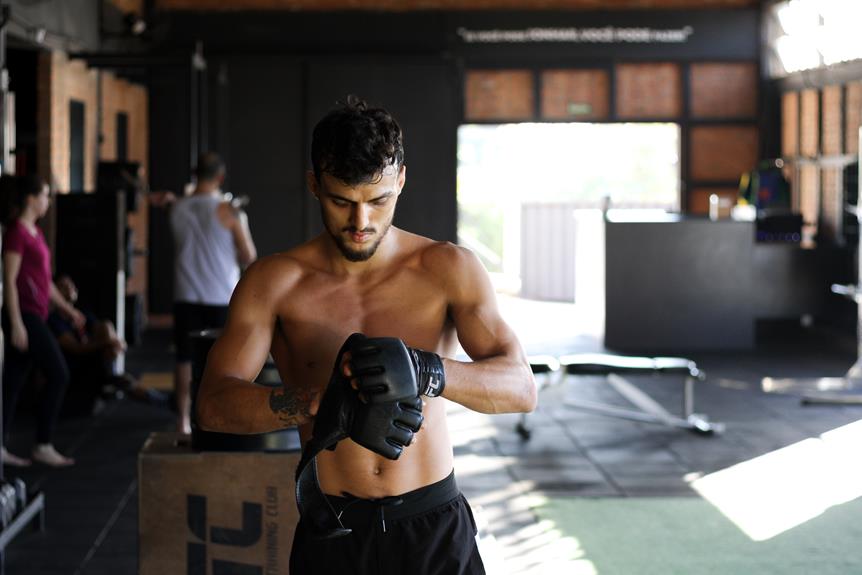Mixed Martial Arts (MMA), a globally popular combat sport that fuses various martial arts disciplines, has found itself entangled in a web of legalities and restrictions across the globe.
In an unfortunate coincidence, several nations still deem MMA illegal or fail to recognize it as a legitimate sport.
This article delves into the depths of these prohibitions, analyzing the underlying reasons and their impact on the growth and development of MMA in different regions.
Prepare to embark on a journey of profound insights and expert analysis into the world of MMA's legal landscape.
Key Takeaways
- MMA is illegal in countries like Norway, Iran, and France (previously) due to various reasons such as government prejudice, perceived barbarism, safety concerns, and opposition from traditional combat sports federations.
- Some countries, including Cuba, North Korea, Republic of Ireland, Iceland, India, and Thailand, do not legally recognize MMA as a sport. Reasons for this range from fears of losing athletes in other sports to self-regulation and lack of government support.
- In Canada, MMA is legal and regulated in most provinces and territories, but remains illegal as prizefighting in Newfoundland, Prince Edward Island, Yukon, and Nunavut.
- The United States has legalized MMA in all 50 states, with the exception of Alaska, which lacks regulation due to the absence of a State Athletic Commission.
Norway: Government Prejudice and Perception
In Norway, the illegality of MMA can be attributed to government prejudice and the perception of the sport as barbaric. Despite MMA's growing popularity in Norway and its impact on the MMA community, the government has maintained a strict stance against the sport. This prejudice stems from concerns over the violent nature of MMA and the potential for serious injuries.
The perception of MMA as barbaric has led to the implementation of strict regulations and laws against the sport. However, it is important to note that the Norwegian government has taken some steps towards recognizing MMA, as the knockout law, which prohibited sports where victory could be scored by knockout, was lifted in 2016.
Nonetheless, the road to full legalization and acceptance of MMA in Norway remains a challenge.
Iran: Ties to Gambling and Violence
The illegality of MMA in Iran can be attributed to its association with gambling and violence. MMA's impact on Iranian society has raised concerns among authorities, leading to a ban on the sport.
The government perceives MMA as a nontraditional martial art that promotes aggression and is linked to illegal gambling activities. In an effort to maintain social order and prevent the spread of violence, the Iranian government has strictly prohibited the practice and promotion of MMA within its borders.
However, despite the ban, there is a hidden MMA scene in Iran, with athletes participating in underground events and training secretly. This underground movement showcases the passion and resilience of Iranian MMA enthusiasts who are willing to risk legal consequences to pursue their love for the sport.
France: Safety Concerns and Opposition
Safety concerns and opposition in France have led to the initial banning of MMA in 2016. The French Judo Federation played a significant role in opposing the legalization of MMA, citing concerns about the safety of the sport. The opposition stemmed from the fear that MMA's popularity would overshadow judo, leading to a decline in its financial interests. The impact of MMA legalization on the popularity and financial interests of judo was a crucial factor in the ban.
Despite this opposition, France eventually legalized MMA in 2020, with the French Boxing Federation taking on the responsibility of regulating the sport. This decision marked a shift in the perception of MMA in France, acknowledging its growing popularity and the need for proper regulation to ensure the safety of its participants.
Cuba: Fear of Losing Best Boxers
Cuba's reluctance to legalize MMA stems from the fear of losing its best boxers. The impact on the boxing industry is a major concern for the Cuban government, as boxing has a long-standing tradition and cultural significance in the country.
The potential benefits of MMA, such as increased revenue and global recognition, are overshadowed by the fear that Cuban boxers will transition to MMA, leaving the boxing industry in jeopardy.
Additionally, there is cultural resistance to embracing a non-traditional combat sport like MMA. Cuba has a rich history of traditional combat sports like boxing and wrestling, which are deeply ingrained in the country's identity. The government and sports authorities are hesitant to disrupt this cultural heritage by legalizing MMA.
North Korea: Lack of Recognition
North Korea's lack of recognition for MMA is primarily due to its limited information and absence of official acknowledgment. The cultural barriers and lack of interest in combat sports within North Korean society contribute to the absence of MMA in the country.
The totalitarian regime's strict control over media and entertainment further hinders the dissemination of information about MMA. Additionally, the government's focus on promoting traditional sports, such as taekwondo and wrestling, leaves little room for the development and recognition of MMA.
The isolated nature of North Korea also limits its exposure to international sporting events and trends, further contributing to the lack of awareness and recognition of MMA within the country.
Republic of Ireland: Lack of Government Support
Unfortunately, the Republic of Ireland consistently lacks government support for the recognition and regulation of MMA as an official sport. This lack of support can be attributed to two main factors: the lack of funding and limited infrastructure.
Firstly, MMA in Ireland suffers from a lack of funding, which hampers its ability to develop and promote the sport. Without sufficient financial support, it becomes challenging to organize events, provide training facilities, and attract top talent.
Secondly, the limited infrastructure for MMA in Ireland further exacerbates the lack of government support. Unlike other countries where MMA has established training centers and professional leagues, Ireland lacks the necessary infrastructure to facilitate the growth of the sport. This includes the absence of dedicated MMA training facilities, coaches, and regulatory bodies.
Consequently, MMA in Ireland remains self-regulated and struggles to gain the recognition and support it deserves from the government.
Iceland: Threat to Traditional Combat Sports
MMA in Iceland poses a significant threat to the country's traditional combat sports. The cultural significance of traditional combat sports in Iceland runs deep, with activities like Glima (Icelandic wrestling) and Hnefatafl (a Viking board game) embodying the nation's rich history and identity.
However, the rise of MMA has challenged the dominance of these traditional sports and raised concerns among purists. Here are five reasons why MMA's impact on Icelandic sports culture is seen as a threat:
- Loss of historical authenticity: MMA's modernity and global appeal overshadow the traditional roots of Icelandic combat sports.
- Dilution of skills: MMA's diverse skill set may dilute the specialized techniques and training methods of traditional combat sports.
- Decline in participation: As MMA gains popularity, there is a risk of fewer individuals dedicating themselves to traditional combat sports.
- Shift in public interest: MMA's captivating nature and high-intensity fights may draw attention away from traditional sports, leading to decreased support and funding.
- Erosion of cultural heritage: The prominence of MMA may diminish the cultural heritage associated with traditional combat sports, diminishing their importance and relevance.
These concerns reflect the deep connection between Icelandic culture and its traditional combat sports, making MMA's rise a contentious issue in the country.
Frequently Asked Questions
What Is the Current Legal Status of MMA in Norway?
The current legal status of MMA in Norway is that it is legal and regulated. MMA regulations in Norway have evolved over time, with the lifting of the knockout law in 2016 allowing for the sport's recognition and practice.
How Do the Iranian MMA Athletes Participate in Events Outside Iran Despite It Being Considered Illegal?
Iranian MMA athletes face significant challenges in participating in events outside Iran due to the sport's illegal status. They operate secretly and illegally, navigating political restrictions and risking potential consequences to pursue opportunities to compete internationally.
When and Why Was MMA Banned in France, and When Was It Legalized Again?
MMA was banned in France in 2016 due to safety concerns and opposition from the French Judo Federation. It was legalized again in 2020, with the French Boxing Federation now regulating the sport.
Why Is MMA Not Recognized as a Sport in Cuba?
Cuba does not recognize MMA as a sport due to cultural factors and historical context. The fear of losing talented boxers, who are the pride of Cuban sports, has contributed to the lack of official recognition.
What Are the Reasons Behind the Lack of Official Recognition for MMA in the Republic of Ireland?
The lack of official recognition for MMA in the Republic of Ireland can be attributed to political reasons and cultural barriers. These factors have hindered the sport's acceptance and support from the government.
Conclusion
In conclusion, the legalization and recognition of MMA as a sport vary across different countries. Factors such as government prejudice, concerns about violence and gambling, and protection of traditional combat sports influence these decisions.
While some nations have lifted their bans on MMA, others still struggle with the lack of recognition and support from their governments. Despite these challenges, the global popularity and growth of MMA continue to defy boundaries and embrace the spirit of resilience. This proves that where there's a will, there's a way.
'Where there's smoke, there's fire.' Similarly, where there's passion and determination, there's potential for success and progress.
- 15 Best Martial Arts Weapons (Fighting & Training) - October 14, 2024
- Is Fencing a Martial Art? (Yes, 4 Reasons Why) - October 14, 2024
- 7 Best Martial Arts for Self-defense Ranked (Highly Effective) - October 14, 2024










